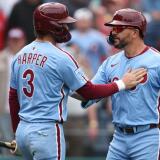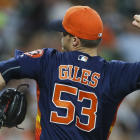On Saturday night, the New York Yankees and Houston Astros will play Game 7 of the 2017 American League Championship Series. The winner will claim the seven-game series, the AL pennant, and a ticket to the World Series, where they'll play the Los Angeles Dodgers for a chance to call themselves baseball's champions.
Before all the action gets underway around 8 p.m. ET, we figured it would be wise to break down what each the Yankees and Astros have working for and against them entering the game.

What the Yankees have working for them
The starting pitching matchup: A lot of attention has been paid to Houston's Charlie Morton and his impressive velocity gains. Inconveniently, some numbers suggest CC Sabathia actually outpitched Morton during the regular season. In roughly the same number of innings, Sabathia was able to post a 122 ERA+ and tally 2.8 Wins Above Replacement; Morton, conversely, managed a 109 ERA+ and 1.8 WAR. (It's worth noting that other advanced metrics, like DRA, favor Morton, so Sabathia being superior isn't a cut-and-dry truth.) In terms of October experience, however, there's no comparison. Sabathia will be making his 22nd postseason start (Morton his fourth), and has outperformed Morton in the tournament, for whatever that's worth.
What the Yankees have working against them
Fatigue: You don't always see this mentioned, but the Yankees have a right to feeling tired. No team has played more games this season. Instead, the Yankees have played the maximum amount. They had to win the AL Wild Card Game, then went the distance in the ALDS before doing it again here in the ALCS. The Astros have played two fewer games, and while that doesn't seem like a big difference, it's hard to know for certain given that the public isn't good at analyzing fatigue or its effect on ballplayers.

What the Astros have working for them
Home-field advantage: Although the Astros had a higher winning percentage on the road during the regular season, hosting a Game 7 remains beneficial to advancing to the next round. (The Yankees had a losing record on the road, going 40-41, as opposed to 51-30 at home.) Historically, home teams win about 54 percent of the time in the MLB playoffs. What's more is the home team has won every game in this series. Neither of those statistics is necessarily predictive, and anything can happen in a single game, but home-field advantage is a bonus if you can claim it for yourself. The Astros, by virtue of their regular season, can do just that.
What the Astros have working against them
Shaky bullpen: During the regular season, the Astros' bullpen was a strength, in large part because of closer Ken Giles and fireman Chris Devenski. The pair collectively tossed 143 1/3 innings and managed a 2.51 ERA and 3.89 strikeout-to-walk ratio. Good marks. Alas, the postseason has been a different animal. Giles and Devenski have combined for nine innings in the playoffs, over which they've yielded 13 hits, nine runs, two homers, and five walks. That's a brutal stretch, small sample or otherwise, for the two most important, most entrusted relievers in the Astros bullpen. If Giles and Devenski continue struggling on Saturday night, in a game in that the Astros are likely to require both to pitch at least an inning, then the Yankees will probably be the team advancing to the World Series.
![[object Object] Logo](https://sportshub.cbsistatic.com/i/2020/04/22/e9ceb731-8b3f-4c60-98fe-090ab66a2997/screen-shot-2020-04-22-at-11-04-56-am.png)


















